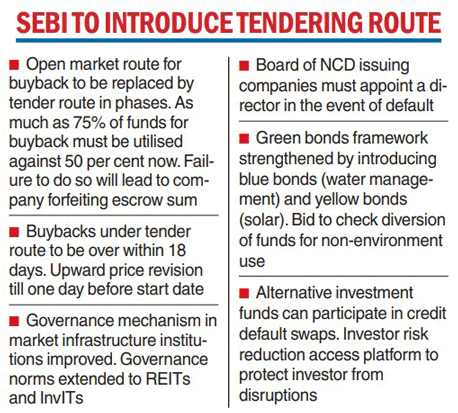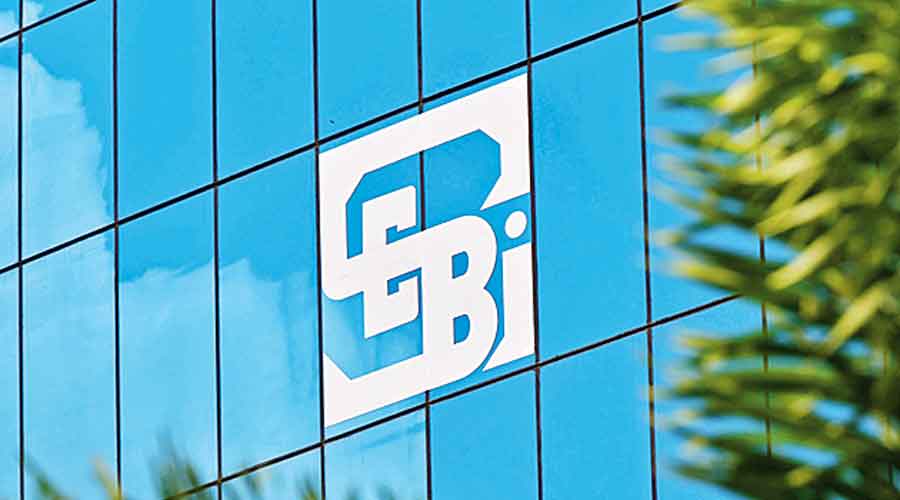The Securities and Exchange Board of India (Sebi) on Tuesday amended its buyback rules to gradually phase out the open market route in favour of the tendering option even as it told companies to utilise 75 per cent of the funds allotted for the repurchase of shares against 50 per cent at present.
The Sebi board also took several other crucial decisions at its last board meeting of 2022 that ranged from strengthening governance mechanisms in market infrastructure institutions — such as stock exchanges, clearing corporations and depositories — and introducing a platform on stock exchanges to reduce the risk to clients in the event of the disruption of services offered by a broker.
Announcing the major changes to the share buyback norms, Sebi chairperson Madhabi Puri Buch said that the tender offer route — where shares are purchased from shareholders and are subsequently extinguished — is the more equitable route, while the open market method is vulnerable to favouritism.
“Nobody knows when a company comes to buyback the shares, only a few are aware. So we are seeking to phase out the exchange route for buyback. This is a glide path and will lead to the phasing out of the present buyback mode (through stock exchange route),’’ she said.
The regulator also amended the rules on the use of the funds kept for buyback. The buyback norms at present require companies to utilise at least 50 per cent of the amount earmarked for this programme. If the listed firms are unable to use the proceeds, Sebi is permitted to direct the merchant banker to forfeit the amount deposited in an escrow account.
Sebi has raised the minimum threshold to 75 per cent from 50 per cent. A press statement from the market regulator was silent on the date the new rule will take effect. More details are likely when Sebi notifies the changes.
Sebi also decided to create a separate window on stock exchanges for undertaking buyback till the time tender offers are fully in effect.
In buyback under the tender route, Sebi reduced the timeline for completion by 18 days. The regulator has dropped the requirement to file the draft letter of offer.
It has also reduced the duration of the tendering period and the period of payment to the shareholders.
Moreover, the regulator permitted the upward revision of the buyback price until one working day prior to the record date.

Check on big brokers
Mumbai: After large banks and NBFCs, it is the turn of big stock brokers.
The Sebi board brought in an enhanced risk management framework for stock brokers designated as Qualified Stock Brokers (QSBs) — who handle a very large number of clients, massive amount of client funds and very large trading volumes.
Though the market regulator refrained from using the term “too big to fail’’, its attempt to prevent a systemic impact in the event of their failure did not go unnoticed.
The Reserve Bank of India had earlier implemented checks on large banks and non-banking finance companies (NBFCs).
Sebi said the possible failure of such brokers has the potential to cause widespread impact on investors and reputational damage to the Indian securities market.
The board approved amendments to the Sebi (Stock Brokers) Regulations, 1992. The market regulator will consequently designate such stock brokers, based on identified parameters, as QSBs.
QSBs, it said, would need to comply with enhanced risk management practices and requirements. There would also be enhanced monitoring by Sebi and the exchanges. The watchdog will announce a detailed framework later.
OUR SPECIAL CORRESPONDENT
Less risk
■ Sebi (Stock Brokers) Regulations, 1992 will be amended, creating a category called qualified stock brokers
■ Big brokers need to comply with strict risk management practices. Framework to be announced










